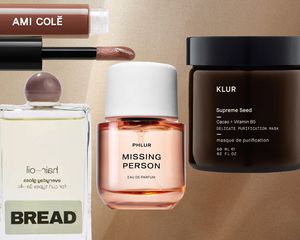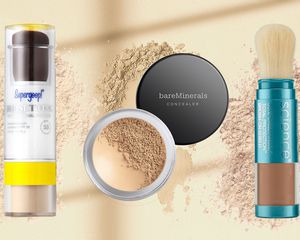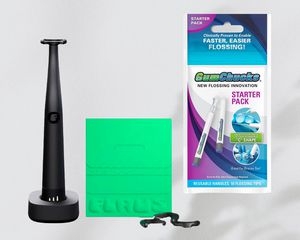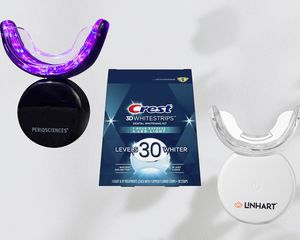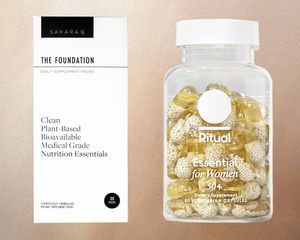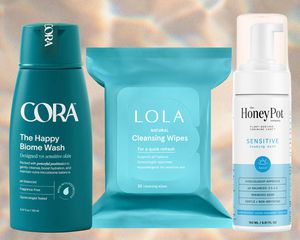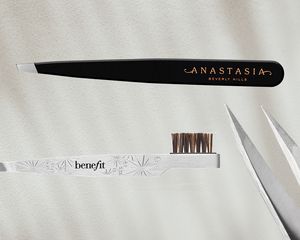:max_bytes(150000):strip_icc()/post-nasal-drip-remedies-4795839_primary-e612336f7c8644c6b53ff05541bd2cc0.jpg)
Unsplash / Design by Bailey Mariner
Here's an interesting bit of information: Your nose and throat naturally produce up to two quarts of mucus every day. (Crazy, right?) The purpose is to moisten your nose and throat while also cleansing these cavities of foreign matter. You'll generally swallow it throughout the day without noticing, but when the mucus secretions (is there a worse pairing of words?) become thick or you're experiencing issues swallowing, you'll feel that leaky-faucet dripping sensation.
While postnasal drip is often associated with head colds, there are myriad other possible causes: allergies, cold temperatures, bright lights, certain foods/spices, pregnancy, and other hormonal changes, to name a few. Certain medications can also bring about postnasal drip, as well as anatomical issues, like a deviated septum. As such, a visit to your doctor and a blood test will be the most effective way to figure out what is causing your postnasal drip.
It's a terribly uncomfortable sensation, especially if you have a sore throat to boot, so we turned to immunologist Ebru Karpuzoglu, MS, Ph.D., CEO of immune-conscious beauty brand AveSeena, and Michelle Yagoda, MD, attending physician and clinical instructor of otolaryngology and facial plastic surgery at Lenox Hill Hospital in New York, to find out how to naturally relieve yourself of postnasal drip symptoms, and to avoid postnasal drip altogether. Read on for what they had to say.
Meet the Expert
- Ebru Karpuzoglu, MS, Ph.D., is the CEO of immune-conscious beauty brand AveSeena. Focused on the idea of certain ingredients being endocrine disruptors, Karpuzoglu created a brand that would combine scientific research and natural ingredients.
- Michelle Yagoda, MD, PC, is a cosmetic plastic surgeon, ENT, and voice care doctor based at New York's Lenox Hill Hospital. She is trained in both cosmetic facial plastic surgery and otolaryngology (ear, nose, and throat medicine, and surgery).
Drink Plenty of Fluids
Drink enough water each day. The CDC recommends 2.7 liters per day, which is about 11 eight-ounce glasses, but some people require even more. Karpuzoglu says drinking water or even broth will help thin the mucus in the throat, allowing it to flow freely through the throat and keep your body well-hydrated. This will help replace the fluids lost during a cold or the flu.
Avoid Caffeine and Alcohol
Alcohol and caffeinated drinks may cause further dehydration (and, as discussed above, fluids are integral to thinning mucus in the body). Not only that but caffeine and alcohol are both inflammatory and could add to your discomfort or contribute to gastroesophageal reflux, which can further contribute to mucus in the throat.
Load Up on Vitamin C
A 2014 study demonstrated that vitamin C may reduce someone's risk for developing a cold and may also reduce the duration of the cold. The best way to load up on this powerhouse ingredient? Diet.
"Lemon is one of the most common home remedies you can use against the drip," says Karpuzoglu. "Vitamin C, a powerful antioxidant, can boost up the immune system to help the body resist various types of infections." She suggests squeezing half a lemon in warm water and adding honey, which is known for its antibacterial and antiviral properties, to taste.
Sip Some Tea
"The warmth of the herbal teas can soothe a sore or irritated throat," Karpuzoglu explains. "Ginger or thyme tea with their antibacterial and antiviral properties can calm the irritated throat and help you to decrease mucus overproduction."
Tea with ginger, in particular, can soothe a sore throat. A 2013 review found that ginger can help suppress mucus production. Be warned though: Ginger supplements are more potent than the ginger root found in your local produce aisle, so those should be taken under medical supervision.
Get Steamy
When the winter temps hit, the air in your home or apartment is super dry, especially with the heater turned on. This can exacerbate mucus levels, so Karpuzoglu suggests using a vaporizer or humidifier to "increase the moisture level in your house, which helps decrease mucus formation, allowing you to breathe easier."
If you don't own a vaporizer or humidifier, try creating an at-home steam room by turning on the shower for 10-15 minutes and sitting in a closed bathroom. A long, hot shower (in which you inhale the steam) can work wonders, as well.
Try Menthol
Eucalyptus and peppermint oil are two common essential oils that are used to help clear the nasal passages and breathe easier (and are ingredients often featured in cough drops and chest rubs). Karpuzoglu suggests adding a couple of drops of these oils in your humidifier's fragrance diffuser to break up the congestion and soothe the nasal passages.
Turn to Chicken Soup
"The powerhouse remedy against postnasal drip is the old-fashioned homemade warm chicken soup," suggests Karpuzoglu. "chicken soup can ease the discomforting symptoms of upper respiratory tract infections and soreness in your throat, and it may reduce the risk of inflammation. Give your grandma’s chicken soup a try to boost up your energy and immune system to get faster relief from the symptoms of cold or flu."
Of course, this trick is really more about the hot liquid and less about the actual chicken, so even vegetarians can enjoy the benefits.
Get an Allergy Test
Just because you're noticing a lot of mucus in your throat, doesn't necessarily mean you're suffering from postnasal drip. In fact, it might just mean you have an allergy to dust, pollen, or even certain foods.
"The cause of post nasal drip can be different for everyone," says Yagoda. "Typically, it is because the roughly one liter of mucus made daily, can not flow freely from your nose and sinuses, into your throat. When that one liter of mucous is partially blocked, (from a deviated septum, enlarged turbinates, nasal polyps, adenoidal hypertrophy, etc.), the mucus becomes thick and sticky and is noticeable as postnasal drip. When there is unobstructed flow, the watery drainage runs like normal saliva down the back of your throat almost imperceptibly. Sometimes, food allergies can cause similar symptoms. A simple blood test can detect most food allergies and is much more effective than guessing by way of eliminating certain foods."

